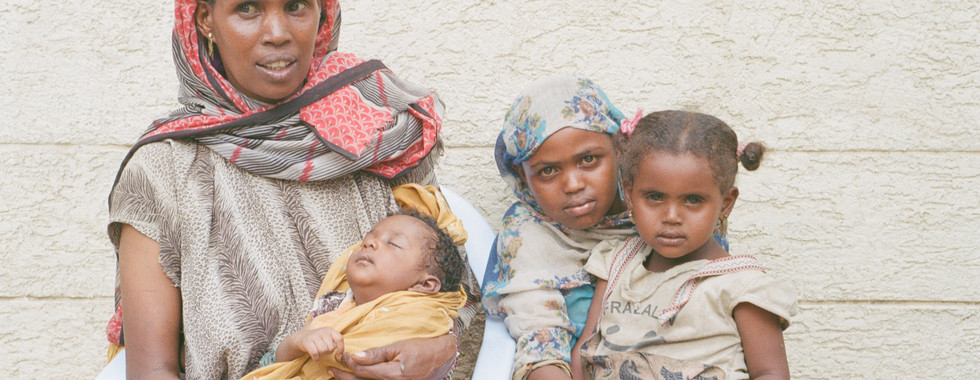Ethiopian Street kid experience
- Cinque Mason
- Jun 15, 2024
- 12 min read
Updated: Jun 21, 2024
Below is a lightly refined interview process and conversation I had with members of Sarahs Kitchen. Authors note: I took a lot of photos in Film and lost them in processing specifically of the Tigraynians. the photos and the narratives are not matched due to lost photography. It pains me a lot to have no access to them.
Ayneda- Oromo
She has been here for five months from Oromo region in a town called Chiro. It took her some weeks to get here. She said the reason she left was because there was no food to eat and she was begging for food with her kids. She decided to come to the big city and beg. She gets on average of 75 birr per day ($1.50) a day.
"Even if I get 100 birr a day I can only get three pieces of bread." She is happy here and she never has to worry about food.
She doesn’t know where her husband. I asked she how she grew up: "with some relatives but when things went wrong with some of them, I had to go to the streets at the age of 16."
She is now 22 years old with two kids. Her parents were farmers. The town she came from raise a local plant and drug called 'chat' but is not extremely fertile in that area.
"Since we are getting food everyday we are all fine."
What are your hopes for the future?
"My hopes are my kids will get a good education one day"
Are you scared sleeping on the street?
"Yes I am still scared sleeping on the street."
Authors note: Flies everywhere
What is Your favorite food?
"My favorite food is everything."
The common Oromo street kid experience in Dire Dawa Ethiopia is a patterned ballad. Many of them coming from the Oromo region where they were told to leave their own family due to disputes or by their parents to go to the city and beg in hopes for a better life.
What is a better life?
A life where there is more food, and more hands that will give out Birr. Even if it is only 100 birr a day ($1.50) that is more than the average day of begging in Oromo.
The Oromo region is spread across all of Ethiopia, it is a tribe that is one of the strongest tribes in east Africa. The music, language, foods, arts, and textiles are still vibrant and strong parts of the country. The Oromo people have a population of which is 34.5% of the total population. They hold significant seats in parliament and produce things such as text, maze, chat, and gypsum in their traditional lands. The common Oromo is noticeably darker than Tigraynians, Afars, or Amharas. The Language is quite different for my foreign ears as well as the names of the kids. Local langugaes vary singificantly For mother in Oromo is Oma, in Amharic it is emat, in tigraynien it is atey. The oromo child is often fleeing economic despair and familial abuse.

The other day these two wandered up to the kitchen after supper when I was playing with the kids, standing sheepishly peering in to eat and the fun we were having. They took a few steps and waited for some approval. I hate to reject a child for a simple meal, even after supper was finished and served I invited them in to eat. Siblings no older than 7. Mired in dust and dirt. Oromo tribe. Same color shirt in a beautiful little synchronicity of their kinship and bond.
Days like this I remember the creator. Their simple attitude of wonderment and curiosity for something on the other side was sparked by divinity.
Unsure if this kitchen would exist tomorrow in this labyrinth of streets where new streets and corners appear every day to the mind of a 6 year old. They left grabing a handful of macaroni and beef to take 'home' with them.
Perhaps this kitchen was a dream or a mirage in their minds, they were sure to bring along any amount of food they could to feed themselves before awakening to the hunger that awaits them.
The only consistency for them is their sibling, a spitting image of themselves and wearing the same red shirt. Their only assurance to the world that the food that they just had was real and that this oasis exists beyond the imaginations of their mind was held by none other, than their brothers keeper.

She has been here for five months in Dire Dawa, she has three kids and sleeps outside. She spends the whole day begging. Her husband is still alive in Tigray. But she is unsure if he is alive since their last talk. She has been away for three years in Tigray. It took her three weeks to get from Tigray to Addis. She is happy here she says.

Rakba Age 7
How are you feeling?
All my siblings have eaten breakfast and lunch and everything is well. I am happy. Generally I have 4 siblings but today only three came.
How are your hands, your stomach, your back, your feet?
"Everything is well. I have no cuts. I have a house on the hill-I come from the desert where my mother has a house and I beg during the day and come to eat. People don’t steal our belongings or money here. We use the money from begging to buy sweets and sell them. My concern is to eat and survive with my family."
-She has no best friend
-She does not know her own age. Around 7.
The people near by told me they have no idea about friendship
She was very scared and felt very nervous, when I went to take a photo of her tears were welling in her eyes.

My name is Rakba
Tigrayan from a village came here due to war
When we have troubles with our eyes we cut our eyelids. When we have headaches we cut our eyes because of the pressure.
-Somewhere in the street they sleep and they beg during the day-
"I came here 1 year ago. I had everything back home but it has been taken it away. We were farmers. We walked some of the journey but also took buses that would pick us. We went many days without food. We begged for money for food and transportation. We lived in the streets and still live here."
She was very nervous and her eyes were cut on her eyelids. She was scared. She did not smile in the photo

Rosena
From Tigray have been in Dire Dawe for 5 months - "we had a house and everything in the country. My family was laborers."
By driving and walking they went to Amhara to Addis to Dire Dawe. The trip took 2 weeks to get to dire Dawe. They slept outside and begged for food.
"We had electronics back home,
We miss most, our relatives and friends the most...When I dream, I dream of meeting with my friends back home….
We sleep on the cardboard and we don’t have anything. I am most afraid of war and the trauma"
She is orthodox Christian. Very confident young lady painted fingernails and was very honest to us. She seemed disturbed but very kind and compassionate. A young woman who is looking out for what she thinks is best.

Bilale
"I am from a village around here. I sleep in a small nest with my brother who is 12 years old. I am not fasting (ramadan) even though I am Muslim.
We were sent with some people to beg for food here.
Where I come from there is nothing. No food, no work. I live on the street here but Life is better here. I don’t wish to go back home. My mother is still there and she sent us to the city to beg for food with some others who were leaving for here. My father is dead."
Young boy who is from this region, very dark and was nervous of what was happening.
The Common Tigranyan Street kid experience is quite different from oromians. They have often, if not always fled Tigray due to the three year long war between the federal government and the Tigrayan People's liberation Front aka TPLF. This war left a scar in the region with reported deaths of over 500,000 and more than 1 million people fleeing the region, for reference the population of Tigray is about 5.75 million people before the war. Being under a financial, commodity, and communication embargo the Tigrayan people fought into victory against the government. This did not come at no cost. Many of the women were sexually abused, many of the men left dead or disabled and children left as orphans. The land of Tigray is still fertile but its buildings are empty and the streets are quiet. Forcing many to flee even months after the war into surrounding regions and larger cities in hopes of economic opportunity and most importantly food.
Tigray, holding an interesting history compared to the rest of the world, is the first point of contact of both Christianity and islam for Africa. I was fortunate enough to visit the first mosque and a few of the original churches while visiting. Tigraynian people are exceptionally proud people with their language, arts, food, language, and most importantly their spirits. Most of the children you see today are young girls forced to be the caretakers of their siblings and exceptionally young boys and girls who imparted on the 1400 km trek to nearby metropolitans. They often sleep outside of the orthodox churches, or nests formed from rubbish and tree branches on quiet street corners. Every single one of them was scared to go to bed every night. When asking the children if they dream I only got one response and it was from a young girl about 14 years old who says she dreams of her friends back home and to visit them again. Many of the kids were not vocal about more personal matters other than their gratefulness towards food and water and the collective horrors they faced which I was unwilling to ask too much about.

Day 2 March 22, 2024
"3 months ago I came to Dire Dawa. It took three weeks to get to Dire Dawa by foot and bus. They got the money for bus and some gave free transport. I have four kids and they traveled here. The father of my kids I do not know where he is. We had a small home. We farmed maze (corn)
I sleep on the street near the Orthodox Church with many others."
What was life like before the war and when the war started to transpire?
"Before the war things were somewhat stable. When the war began all of the crops and goats were taken by the soldiers. The house was demolished from bombs and fire. I do not want to go back, the memories are too bad and there is nothing to return to."
She also lost her brother
“Life is better here on the street where I can eat.”
She was staying in different regions in Tigray during the war. After the war she traveled into Amhara into Addis to Dire Dawa. There were many days when they could not eat.
How did you know when the soldiers were coming?
"There were no electronics and no communication besides word of mouth. When the soldiers were coming they only knew moments before with our own eyes. We had to outrun our invaders while the men stayed to fight"
If you could tell the world anything, what would it be?
"I am so grateful I am being fed well with my family, when I think of what has happened I feel like crying from all of the bad things I have seen. Small girls being raped and shot with guns in the head."
What keeps her strong?
"Help from God, it is God who brought me to this Kitchen. I couldn't imagine the food to be eaten in this quality. She hopes one day things will return to normal."
How do the people treat you here?
"They are friendly here and there is nothing to complain about as"
——she looks down sheepishly
What do you dream of?
‘I have No dreams’
What does she envision for her kids
When things return to normal she hopes her kids to go to education and she gets a house so she can sleep well and her kids get a roof to sleep under.
This woman was piercingly beautiful and caring. Her spirit was incredibly kind and honest. A strength that transpires time and space. A strength that was in her before she was born. She was true strength and care.

Abrhet Hiwot, Meareg, lemelem, nigus
"We are here because we must eat. We left Tigray after the war that lasted 3-4 years. We did not even have salt, Salt is very cheap but during this time we could not even afford that… Any food we could conjure had no season for those years and months we were entrenched in war. We fled via Amhara to Dire Dawa.
We don’t want to go back because of the things we saw. Our houses are gone.Here we have nowhere to sleep, no blankets or mattress. If we sleep here today we change to another place the next day. Before, we did not have to beg. We were farmers. "
She has no husband.
"Instead of begging it was good to farm because we were self reliant. When things are back to normal we will help ourselves and others as anyone should. We make friends with those who beg like us and some friends who are eating here in the kitchen. We would like to have school for our kids. We do not complain. We have food but if we could have anything more it would be a school. We also do not have any clothing. ~~~They sit in tattered clothes ripped and dirty."
Authors note: They do not know what education means but they know they want their kids to go
The crops were irrigated from rain not irrigation.
"We would tell the world we would like to have a better life.What the government did to us the world had witnessed and we hope that the war is not going to continue and real peace to prevail."
Authors note: These were a family of five, four women and one boy. Very sad, feeling their energy. They were nervous, especially the young girl who was 12. Imagine being this young girl understanding the world as she makes the leap from being a kid into being a woman entrenched in war and that puts your perception of people for the rest of your life unless it is fixed and it is not anymore. Her whole identity is now survival, I do not know if she thinks about her childhood or her mind is occupied with the things of pressing issues. They hold a peace amongst them even though they are disturbed. The older woman had a very strong presence and she was still breastfeeding her kid amidst conversation.
I would say the ethos of these women is — It is what we must do.

Oromo Boys 8 and 12 ish
These boys are very skinny: Husel and Fromsa.
Husel has a mother who died and his father passed away when he was little. He has been here for 8 months they are friends. Fromsa lost his father. They don’t go to school. They don’t have money to pay for things and school fees even as little as pens.
They are happy to have food.
If we could do anything it would go to school and have somewhere to sleep. New shoes and clothing. We do not have any dreams
What do you think of when you see rich people
Husel says he thinks 'Nothing'
Fromsa says ;I want to be like them when I see them.'
Are they aware of other countries?
Husel said ‘kefira’… a location here in Dire Dawa. It is where he sleeps.
‘I do not know what Addis Ababa is’
They are unaware of even the capital of their country Addis Ababa
What do you think is outside of this area?
They are unaware of this and to the best of our questioning they have never pondered this question.
Both of their favorite fruits is watermelon
What do they think of white people?
They think it looks cool and good
They did not respond to the dream question
I showed them my city where I grew up, in Denver Colorado. To see what they thought of outside of the perimeters they were living in. They said few things other than it looks cool. My next series of questioning is asking what they think of Chinese people that come around and where they think they come from. They said they did not ever wonder.They may not think of that at all and see people purely as a coming and going factor in life. An aimless wander that is not easily defined of what they are doing other than surviving. They may think everyone is simply trying to survive they may not. I am afraid to ask some questions because they are so deep and sad. But this must be shown, the voices of these children is very necessary to be spoken allowed to those who may be able to ask a serious change in at least these few lives…
The humming bird parable…In a story from the Quechua people in Peru, a hummingbird fetches drops of water to help put out a great forest fire. The other animals laugh at her, but the bird replies, “I'm doing what I can”.
These boys were very sheepish when asking them questions they had no idea of what was outside of these city limits or what may exist for them outside.. At least that is what they were telling me, and I think if I were able to phrase the question better or speak their language I would be able to hear more of their inner thoughts, but for the moment that is not the case. Most of their dreams is to go to school.
I always wondered: Do you think everyone lives a life like you? Do you think everyone is thinking about survival and has to go through the same things as you… what do you think when you see me? What do you think. My life is like

The average girl on the street faces horrors we can all imagine, from sexual abuse to disrespect, the young girl is often wary of all individuals who pass into their proximity and the pains they may. In the unknown or known absence of their parents they are forced to focus on survival. There are some things you don’t need to hear from someone, looking into their eyes is enough. I hope this book allows one to peer into the untold stories








































































Comments